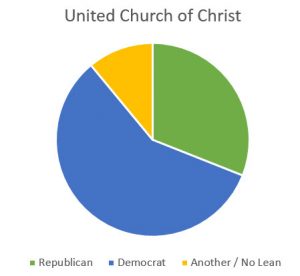 If you know much about American Christianity, you may expect Mainline Protestants to be more likely to have more liberal political leanings than the average American. The Pew Research Center’s 2014 Religious Landscape Study affords an unparalleled look at this topic by breaking down many of the larger religious denominations by what political party their members self-identify as leaning toward or with which they affiliate.
If you know much about American Christianity, you may expect Mainline Protestants to be more likely to have more liberal political leanings than the average American. The Pew Research Center’s 2014 Religious Landscape Study affords an unparalleled look at this topic by breaking down many of the larger religious denominations by what political party their members self-identify as leaning toward or with which they affiliate.
Among all US adults the survey found that 37% are or lean Republican, 44% are or lean Democrat; and 18% associate with another party or don’t clearly lean toward a specific party. When compared to this standard, five traditions the survey considers Mainline are more conservative:
- Anglican
- United Methodist
- American Baptist
- Presbyterian (USA)
- Lutheran ELCA)
while only two traditions the survey labels as Mainline are more progressive:
- Episcopal
- United Church of Christ.
United Church of Christ
I have spent most of my life as a part of three of congregations affiliated with three of the traditions listed above. Most recently, I have served three congregations affiliated with the United Church of Christ. Notably, no Christian tradition is more politically progressive according to the Pew study aside from three historically black traditions. The only other groups with higher percentages of adherents who are or lean Democrat are non-Christian religions (Jewish, Muslim, Hindu, Buddhist, and Unitarian Universalist) and non-religious people (Agnostic and Atheist).
So What?
During this political season, it is important for people to realize just how diverse the political allegiances are not only of Christians as a whole but also of subgroups of theologically similar Protestants, including the Mainline.
- How closely does your denomination or tradition’s breakdown match what is found in your local congregation (based on your best guess of the makeup of your congregation)?
- Are you surprised that among Mainline Protestants Anglicans and United Methodists are the two traditions with the highest percentage of members who self-identify as being or leaning Republican while Episcopalians and members of the United Church of Christ have the highest percentage of members who self-identify as being or leaning Democrat? Why or why not?